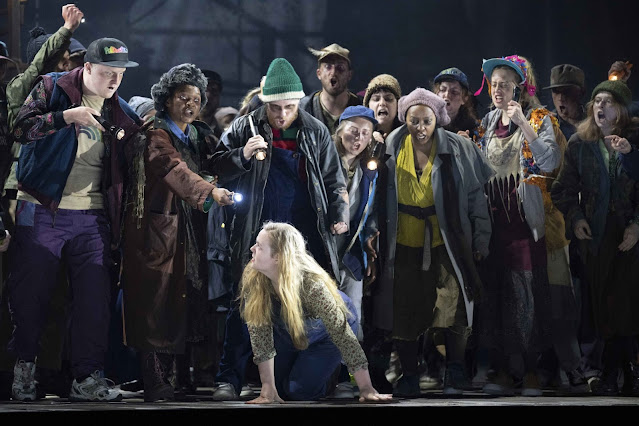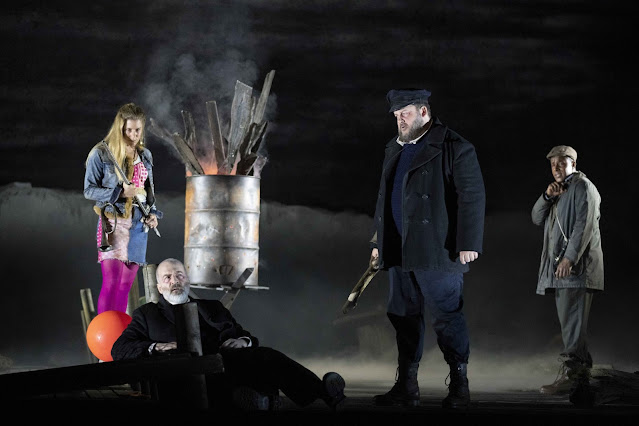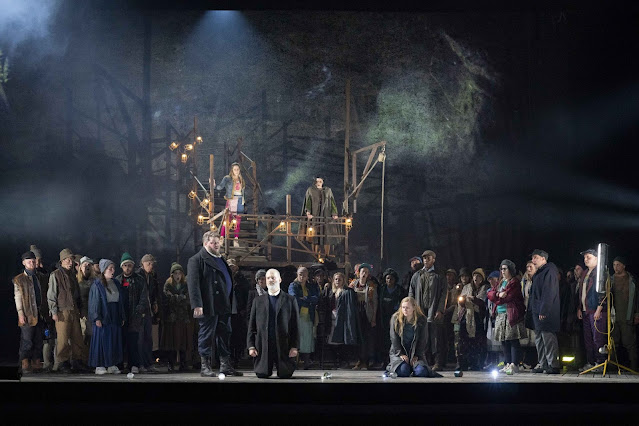 |
| Smyth: The Wreckers - Karis Tucker - Glyndebourne (Photo Richard Hubert Smith) |
Ethel Smyth: The Wreckers; Karis Tucker, Rodrigo Porras Garrulo, Philip Horst, Lauren Fagan, dir: Melly Still, cond: Robin Ticciati, London Philharmonic Orchestra; Glyndebourne
Reviewed 21 May 2022 (★★★★★)
So, The Wreckers would be an achievement by a long chalk, but unfortunately the work has had a spattered history. Smyth was very much a European, trained in Leipzig her friends were all Europeans and her early career was all in Continental Europe. When the Great War started in 1914, she had three major productions of her operas in progress or planned. At a stroke her European career was over, and she never wrote another large scale opera. The Wreckers, marooned in England with an inferior English libretto rather struggled. Warwick University's performance in 1983, directed by Graham Vick, remains a vivid memory for me but subsequent encounters with the opera have been more mixed. Duchy Opera very sensibly commissioned a revised English libretto from Amanda Holden, yet still the opera languished.
Glyndebourne announced Smyth's The Wreckers for 2020, and thankfully the company has kept faith and Melly Still's production of the opera opened Glyndebourne's 2022 season on Saturday 21 May 2022. The work was performed in a new edition which returned it to Smyth's original manuscript, and used Henry Brewster's original French libretto. Karis Tucker was Thurza (Thirza), Rodrigo Porras Garulo was Marc, Philip Horst was Pasko, Lauren Fagan was Avis with Jeffrey Lloyd-Roberts, Marta Fontanals-Simmons, Donovan Singletary, and James Rutherford. Designs were by Ana Ines Jabares-Pita, choreography by Mike Ashcroft, lighting by Malcolm Rippeth, and video by Akhila Krishnan. Robin Ticciati conducted the London Philharmonic Orchestra.
 |
| Smyth: The Wreckers - Glyndebourne (Photo Richard Hubert Smith) |
Rather than performing the work from the published full score which is based on the cuts Smyth made for the first English performance, the edition used returned to Smyth's original score. This was published as a vocal score in Germany in 1906/07, but the sole full score that seems to survive has been marked up with the cuts for the English premiere including some pages removed, so Tom Poster has recreated Smyth's orchestrations for these.
And why French? Well, Smyth's close friend Henry Brewster was born in France of American parents. Whilst he had helped her with the German librettos to her first two operas, he preferred writing poetry in French. Smyth realised that an English performance of the opera was unlikely and so they aimed for a French language one; as Andre Messager due to be the musical director of the Grand Season at Covent Garden, the possibility of a French language performance there seemed likely at one point. I have no idea of the quality of Brewster's poetry, but there is no doubt of the confidence of his libretto, and it is a shame that its reputation has been obscured by the terrible fustian operatic English that the work was translated into for the English performances.
One thing that hearing it in French brought over was the French influences on Smyth's music. Whilst she was German trained (in Leipzig) and much influenced by the Brahms school, there were clear echoes of Bizet and Massenet here. Her musical style is not avant garde for the time, but musically the work exists securely in Smyth's own language. What was advanced for its age was the nature of the heroine, Thurza (Thirza in the English version). She is her own woman, and her final avowal of regretting nothing, powerfully defying conventions, was Carmen in spades except Carmen is self-consciously at 'bad girl' whereas Thurza was simply an ordinary woman trapped in a loveless marriage. No wonder, at the 1906 premiere in Leipzig, extensive cuts were made to the last act. And it would be some time before opera had another heroine as remarkable as Thurza.
 |
| Smyth: The Wreckers - Lauren Fagan, Philip Horst, James Rutherford, Donovan Singletary - Glyndebourne (Photo Richard Hubert Smith) |
Central to the success of Glyndebourne's performance was the remarkably taut and powerful account of the music from Robin Ticciati and the London Philharmonic Orchestra. From the very first notes of the overture right through to the dying final notes, this was a vividly conceived and highly dramatic performance. It was a world away from the rumbustious post-Brahms manner that other conductors have adopted for this music, and it worked. This was a gripping performance, brilliantly played by the LPO and given the work's patchy performance history this was almost certainly one of the finest accounts of the score given so far in the work's history.
Melly Still and designer Ana Ines Jabares-Pita set the opera in a bleak, loosely 20th century context. The set was a simple black box, the back of which formed the backdrop for Akhila Krishnan's videos, sometimes of the sea and its breaking waves and sometimes abstract. During Act One, with the plans for the opera's first act of wrecking, there were images of past lives lost projected whilst throughout the evening four female dancers in black Edwardian dress seemed to embody the spirit of the sea and the ghosts of those past lives.
The spare set (a door and steps in act one, a sort of jetty and the beacon in act two, a precipitous set of steps descending from the flies in act three) left plenty of space for the chorus. Remarkably, this is a chorus opera par excellence. I will not go into the putative links with Britten's Peter Grimes, but Brewster and Smyth's depiction of the community in which the protagonists live is simply remarkable, and throughout the opera the Glyndebourne Chorus were thrilling and chilling, turning angry and vicious in a moment and making such great moments as the Act One finale into wonderfully vivid music theatre.
The long first act sets the scene and introduced us to the characters, as well as setting in motion the tragic plot. Avis accuses of Pasko of being the traitor who is lighting beacons which warn ships, thus stopping them being wrecked and foiling the villagers' livelihood. Avis does so because she is in love with Marc, but who rejects her and when Avis discovers that Marc is in love with Pasko's wife Thurza, Avis wants revenge. We also learn that Thurza is trapped in a loveless marriage, and Pasko is frustrated to the point of madness by his wife's rejection of him.
 |
| Smyth: The Wreckers - Philip Horst - Glyndebourne (Photo Richard Hubert Smith) |
Act two contrasts Avis' toying with the affections of the young boy Jacquet with Thurza and Marc's long scene together. At the end of the act, Pasko is discovered apparently unconscious by the beacon, but he stays silent because he has realised that Thurza is involved. Act Three is the highly tense trial of Pasko, where Marc and Thurza admit their guilt and Thurza gives that amazing avowal of regretting nothing.
Some of this, particularly the lovers' Act Two scene, might suggest Wagner but whilst Smyth admired Wagner she didn't do transcendence. What her characters do is strive, the lovers Act Two duet is a hard won piece, tautly written and the same happens in Act Three. Whilst the musical language is different, some elements reminded me of the strenuousness of the way the Italian Verismo school approached drama. There are tunes, but Smyth does not always use them for the big dramatic moments. In Act Two, when we first meet Marc, he is alone and has a solo about Thurza which Smyth starts with the voice unaccompanied.
If there is a weakness, it is that the lovers are too much in the background for the first half of the opera. In Act One, it is Pasko who is in the foreground and there are moments when the drama seemed to hang fire slightly, and you began to understand why Smyth might be willing to introduce cuts. We only really meet the lovers once, in their duet in Act Two.
Karis Tucker gave a remarkable performance as Thurza, managing to be convincingly downtrodden in Act One, rejecting her husband whilst always being submissive. Tucker only gradually revealed the character's inner strength; a remarkable performance but it did leave the opera initially without an obvious heroine. She and Rodrigo Parras Garulo gave a powerful and sinewy account of their Act Two scene, where Tucker's Thurza revealed herself to be as strong minded as her lover. She is not swept away by foolish romantic passion but by a strong determination. In Act Three, the trial happens around her and then Thurza steps in. Here Tucker's performance was simply astonishing, building to a blazing account of Thurza's avowal of everything she has done, her lack of regret.
Rodrigo Parras Garulo gave a strong and sinewy account of Marc's music, a dark centre to Parras Garulo's voice (he sings Puccini's Calaf) bringing a rough-hewn element to Marc, very much helped by the fact that Parras Garulo looked believably like a fisherman. Whilst Marc's ultimate role is musical support for Thurza, he isn't a passive character and the Act Two scene develops because he plans to leave and let Thurza get on with her life. Parras Garulo's account of Marc's two folk-ish songs that Smyth give the character was finely graded and was able to fine his strong voice down, yet came over as wonderfully resolute at the end.
Thurza's troubled husband Pasko, the village pastor and leader of the wreckers, was made believable if not entirely sympathetic by Philip Horst. Horst made Pasko a man of strong emotions, largely under check, and he responded magnificently two the pair of complex solo scenes that Brewster and Smyth give him (in Acts One and Two). Yet it is the moment at the end that stays in the memory, when Horst's Pasko viciously told his wife that she was not going to die but would survive to live a life of repentance.
One of the strengths of Still's production was how it made us see that everyone regarded themselves as acting rightly, there were no real villains. This approach worked well for the young woman, Avis, who is in love with Marc but is rejected. Lauren Fagan sang with a striking sense of intensity and self-possession. What Avis does can be seen as unforgiveable, yet Fagan made her believable and understandable whilst giving us some terrific singing.
Marta Fontanals-Simmons made a delightfully believable Jacquet, a loose-limbed teenage boy with a crush on Lauren Fagan's Avis who toys with him just enough that the boy does anything she wants. Jacquet's father, Tallan (Jeffrey Lloyd-Roberts) is the inn keeper and Lloyd-Roberts made him a strong and characterful element in the supporting cast. Similarly, Avis' father Laurent (James Rutherford) was another well etched character, and Rutherford really showed his mettle in Act Three when Laurent is revealed as the judge for the kangaroo court. Yet his most intense moment is the end, when he rejects his daughter Avis, and here Rutherford was incandescent. The final character was Harvey, one of the senior parishioner. Donovan Singletary portrayed him as a decent man, following his pastor Pasko's lead, and Singletary was a firm contributor to the ensembles.
The chorus was a character in its own right. Dressed in scavenged scraps and rags, and carrying home-made masks for the wrecking, every chorus member seemed to have created an individual, yet is was when they came together in chorus scenes of vivid intensity and viciousness that we remember them best. There was never a weak chorus moment, throughout it well calibrated and superbly done.
 |
| Smyth: The Wreckers - James Rutherford, Philip Horst, Karis Tucker - Glyndebourne (Photo Richard Hubert Smith) |
Musically, we can hear the various influences on Smyth's music and we must regret Brewster's death in 1908, depriving us of the possibility of his and Smyth developing their ideas further. Any performance of The Wreckers at Glyndebourne was going to be memorable, but Robin Ticciati and Melly Still revealed quite how remarkably taut and vividly dramatic Smyth and Brewster's opera can be. It may not be quite the forgotten masterpiece that legend tells of, but this performance showed that The Wreckers can be a work of gripping and moving drama, and deserves to be heard more often. The opera is in repertoire at Glyndebourne until 24 June 2022, and will be at the BBC Proms, in a semi-staged performance at the Royal Albert Hall on 24 July 2022. Then in September 2022, Robin Ticciati conducts the same cast in a performance in Berlin with his Deutsche Symphonie Orkester Berlin.
Never miss out on future posts by following us
The blog is free, but I'd be delighted if you were to show your appreciation by buying me a coffee.
Elsewhere on this blog
- Blow's Venus & Adonis and Purcell's Dido & Aeneas from HGO - opera review
- Rediscovering the joys of playing together: Noemi Gyori & Gergely Madaras their disc of flute duets - interview
- Magical places: Sam Cave's Refracted Resonance explores contemporary music for classical guitar - record review
- Shining Shore: The Music of Early America a delightful disc from Three Notch'd Road: The Virginia Baroque Ensemble - record review
- The lakeside theatre returns: I chat to Kirsty Hopkins, artistic director of West Green House Opera, about the company's plans - interview
- The TRUMPETS shall sound! FANFARE 250 for the Fine City of Norwich - concert review
- Art and Music at Sheffield Chamber Music Festival - concert review
- Vividly present playing & discreet virtuosity: Ensemble 360 at the launch of Music in the Round's 2022 Sheffield Chamber Music Festival - concert review
- Unique in the Canadian cultural landscape: conductor Mark Vuorinen on the Elora Singers - interview
- The Earth Moves: The Tallis Scholars in Antoine Brumel and David Lang - concert review
- Samuel Barber: The Complete Songs, Dylan Perez & friends survey nearly 50 years of the composer's songs including those unpublished during his lifetime - record review
- Boulevard des Italiens: tenor Benjamin Bernheim explores Paris' long love-affair with French composers - record review
- Winds of Change: a survey of Ruth Gipps' wind chamber music from 1943 through to 1995 - record review
- Home











No comments:
Post a Comment